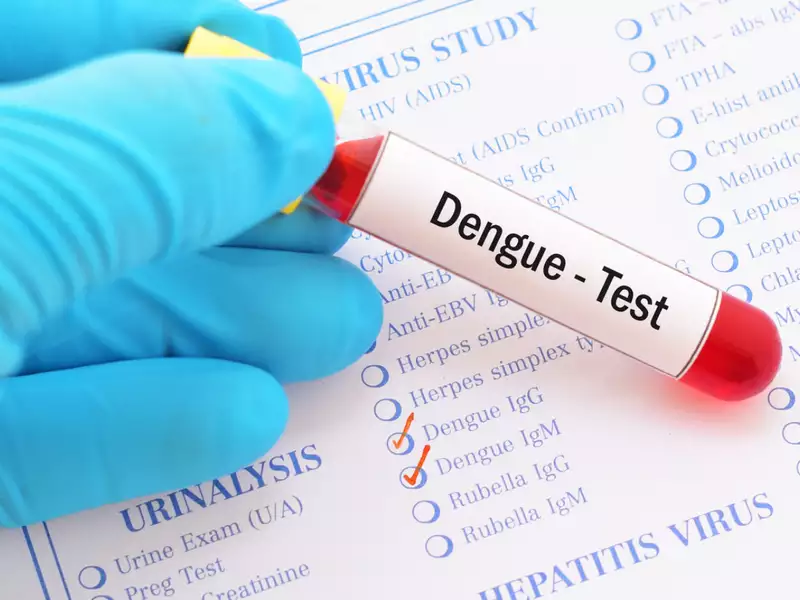
What does the dengue fever antibody test mean?
Dengue fever is an illness caused by transmission of dengue virus from mosquitoes. Do you know that dengue infection is actually from an infected female mosquito specifically the Aedes species that bites humans? A mosquito is said to be an infected mosquito with dengue virus when it bites humans with circulating dengue virus inside the human body. Transmission of dengue virus to the other person is through bites of the infected mosquitoes that release the dengue virus into the human body. In short, mosquitoes only act as vectors which acquire and deliver the dengue virus into the human body.
This disease is common in tropical countries such as in Malaysia. There are many advertisements either on TV, social media or outdoor billboards emphasising on dengue. This alone shows how significant dengue issues are in the country. It may seem easy to suspect a person with dengue fever as generally they do show symptoms of dengue fever but to confirm a diagnosis may not be that easy without using additional tests such as antibody tests. You will learn more about the meaning of the dengue fever antibody test through this article.
Antibody test in general is a test that helps to look for antibodies in humans. Dengue antibody test is a specific test to detect dengue antibodies. To understand how an antibody test works, we must first know what exactly an antibody is. Antibodies are products produced by the human body when a person is infected. Presence of antibodies shows that the immune system is trying to eliminate the infections. In case of dengue fever antibody test, what we are looking for is antibody that is produced from the dengue infection. Common antibody test used for dengue fever is an ELISA test which examines the blood samples taken from the people suspected with dengue infection.
Dengue antibody tests look specifically for antibodies IgM or IgG. Why does it matter to detect IgM or IgG? Presence of high IgM means the person is having an ongoing dengue infection whereas presence of IgG usually means a person has already been infected with dengue virus before the current infection. In other words, positive dengue IgM indicates current dengue infections or recent past infections (up to 90 days) whereas positive dengue IgG with positive IgM means the person is currently infected. It is possible that a person has positive IgG but negative or low IgM meaning the antibodies detected were from past dengue infection. It is understandable that antibodies test results may be confusing so it is best to ask your healthcare provider for more explanation.
Antibody test is usually done when a person is presented with dengue symptoms or has exposure to the dengue infection such as a report of a neighbour diagnosed with dengue fever. Common symptoms include high fever lasting for 2 to 7 days and other associated symptoms such as joint pain (arthralgia), muscle pain (myalgia), headaches with pain behind the eyes (retro-orbital headaches), nausea, vomiting, skin rash and swollen glands. Should such symptoms be present, the person needs to get to the healthcare facility as soon as possible. This is because symptoms may seem to subside around the 3rd to 7th days after the initial symptoms which most will think that they are free from dengue.
However, this is in fact the critical phase where a person’s health may suddenly deteriorate and lead to life-threatening events, sometimes even death. Critical phases last for 24 hours to 48 hours. Hence, if you or someone you are taking care of needs to stay in the hospital for a while, please follow doctor’s advice of staying in the hospital so that if a critical phase does occur, medical help is within reach and healthcare providers can help patients to get through this phase by providing treatment or support. Warning signs such as sudden abdominal pain, vomiting blood, presence of blood in stool, bleeding gums, nose bleeding, breathing difficulty, fatigue or persistent vomiting more than 3 times within 24 hours, should be signs that a person needs to get to the emergency room promptly.
Apart from the ELISA test as an antibody test, the NS1 antigen test is also used to detect dengue infection. This test emphasises on detecting the non-structural glycoprotein 1 (NS1) antigen that circulates at high level during the first few days of dengue infection course. NS1 test is usually done only when a person complains of dengue symptoms for the first few days as the test is only sensitive during this time. NS1 test may be combined with antibody tests of IgM and IgG.
It can be concluded that antibody tests are usually done when patients raise high suspicion of dengue fever. The importance of antibody tests is to detect whether the dengue infection is present or not since symptoms of dengue fever may resemble other medical conditions. It is vital to get yourself checked whenever you have dengue symptoms since currently there are no specific medicines that can treat dengue infection just as antibiotics treat bacterial infections. Speaking of antibiotics, never use antibiotics to treat yourself since it can lead to antibiotic resistance and there is no use of antibiotics in dengue infection since it is a viral infection. Treatments of dengue fever revolve around supporting patients’ wellbeing and to improve symptoms.
Buy Casodex 50mg Tablet 28s (box).



